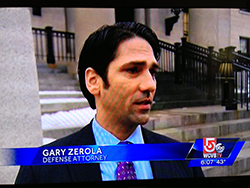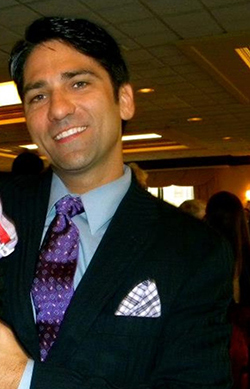Attorney Gary Zerola Boston
Cell phone towers and the Fourth AmendmentElle Rodman
 Each man’s home is his castle. The Fourth Amendment to our Constitution states “the right of a man to retreat into his own home and there be free from unreasonable governmental intrusion.” So how does this fly in the face of location tracking on our cellular phones?
Each man’s home is his castle. The Fourth Amendment to our Constitution states “the right of a man to retreat into his own home and there be free from unreasonable governmental intrusion.” So how does this fly in the face of location tracking on our cellular phones?In this age of social media, your mobile app of Twitter, Facebook, Instagram or Foursquare shows the world where you are actually located, where you got a burger, or with which friends you took a selfie. Using these services is your tacit choice to reveal this information about your self. But should you expect your location to be available to the government simply by carrying a cellular phone? Cell phones are so indelibly a part of our lives… What is it allows law enforcement intrusion into our lives? Is it ok to track someone’s whereabouts using cell tower intel without probable cause? Is this a privacy infringement - an “illegal search an seizure?”
These are very important questions, ones raised by Boston Defense Attorney Gary Zerola, in Commonwealth v Rodriguez. In 2013, Attorney Zerola proved that if you track someone’s phone, you are essentially tracking them, which is infringes a citizen’s privacy, and their Fourth Amendment rights. He argued that his clients’ rights were violated through the cell tower “pings.”
 In order to track a suspect’s whereabouts through their cell phone, law enforcement can get the suspect’s phone service provider to reveal their own customer’s confidential information, in the name of justice. In Commonwealth v. Rodriguez, (Massachusetts Middlesex Superior Court 2012), police feigned fear of “officer safety” to necessitate T-Mobile to reveal real time tracking of a subscriber to Saugus Police, enabling surveillance of a suspect, leading to a search warrant.
In order to track a suspect’s whereabouts through their cell phone, law enforcement can get the suspect’s phone service provider to reveal their own customer’s confidential information, in the name of justice. In Commonwealth v. Rodriguez, (Massachusetts Middlesex Superior Court 2012), police feigned fear of “officer safety” to necessitate T-Mobile to reveal real time tracking of a subscriber to Saugus Police, enabling surveillance of a suspect, leading to a search warrant. Attorney Gary Zerola proved that the illegal electronic monitoring of cell phone location “pings” from his client’s cell phone led police to a place with no reason to enter. This happened after the suspect’s phone carrier, T-Mobile provided real-time location information using features installed on the suspect’s cell phone. According to the Middlesex Superior Court ruling, “The Fourth Amendment intrusion stems from the use of electronic means to find out information that the police would not have been able to obtain using visual surveillance.”
 Middlesex Superior Court ruled that “evidence obtained through execution of a search warrant that is based upon a violation of the defendant’s Fourth Amendment rights must be suppressed….” and, “ the use of real-time monitoring to track the location of a cell phone to a private residence, unsupported by a search warrant or probable cause order, violated the Fourth Amendment.”
Middlesex Superior Court ruled that “evidence obtained through execution of a search warrant that is based upon a violation of the defendant’s Fourth Amendment rights must be suppressed….” and, “ the use of real-time monitoring to track the location of a cell phone to a private residence, unsupported by a search warrant or probable cause order, violated the Fourth Amendment.” “When I first agreed to accept representation in this case,” said Zerola, “I knew the constitutional challenges in this case would be hard, and an issue of first impressions in Massachusetts trial court, because technology has clearly outpaced the development of the governing law.”
“When I first agreed to accept representation in this case,” said Zerola, “I knew the constitutional challenges in this case would be hard, and an issue of first impressions in Massachusetts trial court, because technology has clearly outpaced the development of the governing law.” One year after Attorney Zerola successfully proved this monumental point, another case, Commonwealth v. Augustine was raised in appeal, and brought to the Supreme Court in Massachusetts, where Zerola’s case stood in precedence . The judge in this case agreed. Cell tower information tracks a citizen. Law enforcement must prove probable cause to access your private cell location information.
Criminal Defense Attorney Gary Zerola maintains offices in Boston and the North Shore. He can be reached at 617-654-9300 24/7






